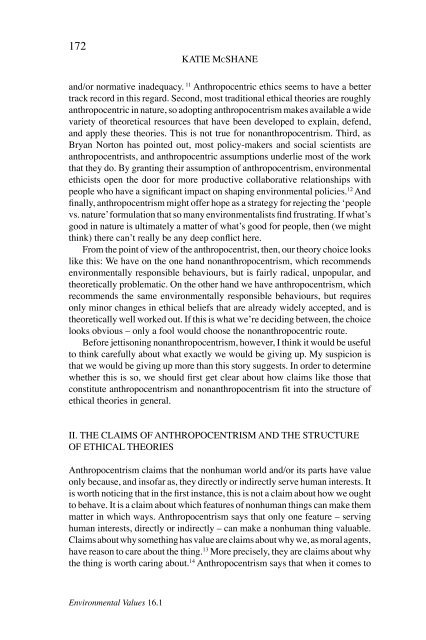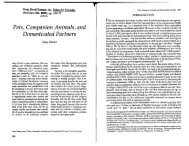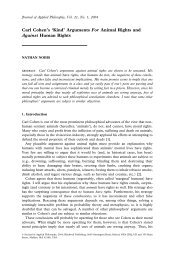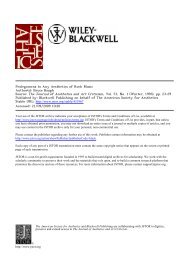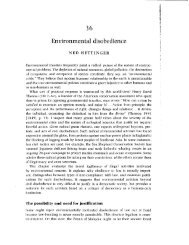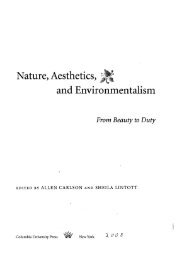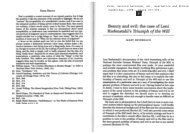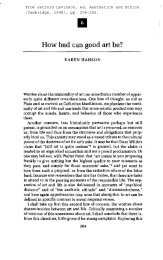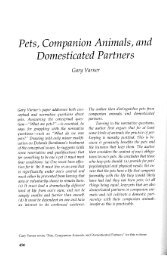Anthropocentrism vs. Nonanthropocentrism: Why Should We Care?
Anthropocentrism vs. Nonanthropocentrism: Why Should We Care?
Anthropocentrism vs. Nonanthropocentrism: Why Should We Care?
Create successful ePaper yourself
Turn your PDF publications into a flip-book with our unique Google optimized e-Paper software.
172<br />
KATIE MCSHANE<br />
and/or normative inadequacy. 11 Anthropocentric ethics seems to have a better<br />
track record in this regard. Second, most traditional ethical theories are roughly<br />
anthropocentric in nature, so adopting anthropocentrism makes available a wide<br />
variety of theoretical resources that have been developed to explain, defend,<br />
and apply these theories. This is not true for nonanthropocentrism. Third, as<br />
Bryan Norton has pointed out, most policy-makers and social scientists are<br />
anthropocentrists, and anthropocentric assumptions underlie most of the work<br />
that they do. By granting their assumption of anthropocentrism, environmental<br />
ethicists open the door for more productive collaborative relationships with<br />
people who have a significant impact on shaping environmental policies. 12 And<br />
finally, anthropocentrism might offer hope as a strategy for rejecting the ʻpeople<br />
<strong>vs</strong>. natureʼ formulation that so many environmentalists find frustrating. If whatʼs<br />
good in nature is ultimately a matter of whatʼs good for people, then (we might<br />
think) there canʼt really be any deep conflict here.<br />
From the point of view of the anthropocentrist, then, our theory choice looks<br />
like this: <strong>We</strong> have on the one hand nonanthropocentrism, which recommends<br />
environmentally responsible behaviours, but is fairly radical, unpopular, and<br />
theoretically problematic. On the other hand we have anthropocentrism, which<br />
recommends the same environmentally responsible behaviours, but requires<br />
only minor changes in ethical beliefs that are already widely accepted, and is<br />
theoretically well worked out. If this is what weʼre deciding between, the choice<br />
looks obvious – only a fool would choose the nonanthropocentric route.<br />
Before jettisoning nonanthropocentrism, however, I think it would be useful<br />
to think carefully about what exactly we would be giving up. My suspicion is<br />
that we would be giving up more than this story suggests. In order to determine<br />
whether this is so, we should first get clear about how claims like those that<br />
constitute anthropocentrism and nonanthropocentrism fit into the structure of<br />
ethical theories in general.<br />
II. THE CLAIMS OF ANTHROPOCENTRISM AND THE STRUCTURE<br />
OF ETHICAL THEORIES<br />
<strong>Anthropocentrism</strong> claims that the nonhuman world and/or its parts have value<br />
only because, and insofar as, they directly or indirectly serve human interests. It<br />
is worth noticing that in the first instance, this is not a claim about how we ought<br />
to behave. It is a claim about which features of nonhuman things can make them<br />
matter in which ways. <strong>Anthropocentrism</strong> says that only one feature – serving<br />
human interests, directly or indirectly – can make a nonhuman thing valuable.<br />
Claims about why something has value are claims about why we, as moral agents,<br />
have reason to care about the thing. 13 More precisely, they are claims about why<br />
the thing is worth caring about. 14 <strong>Anthropocentrism</strong> says that when it comes to<br />
Environmental Values 16.1


